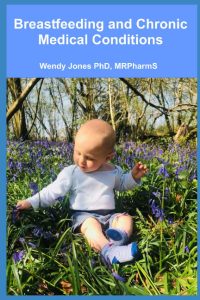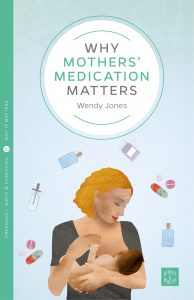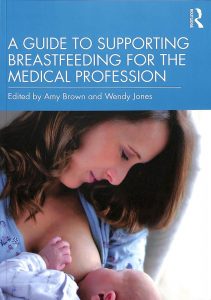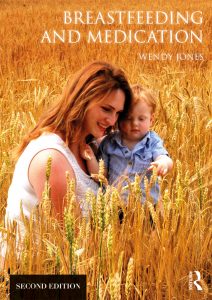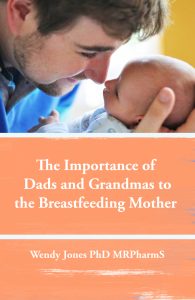Home » 2018
Yearly Archives: 2018
Bisoprolol and Breastfeeding
Bisoprolol use seems to be increasing from the queries I receive. It is difficult to assess safety as published information relies on one study where the level in milk was undetectable BUT the baby was not given any of its mother’s milk. If other beta blockers are not suitable then the baby should be monitored closely for side effects and particularly hypo-glycaemia if newborn.
The manufacturer states that small amounts (<2%) are secreted into milk of animals. If used during breastfeeding monitor the baby for drowsiness, lethargy, weight gain and effective feeding
Bispropolol and breastfeeding factsheet
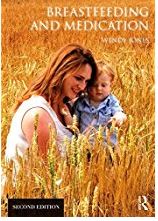
Wendy Jones MBE
That new title is going to take a lot of getting used to! I am very proud and delighted to have been nominated for an MBE for services to mothers and babies as a founder of the Breastfeeding Network Drugs in Breastmilk Service. I never thought this would happen to me following a path which I didnt really plan 22 years ago but has led me to this amazing place. I feel inspired to keep going and hopefully change some more professional attitudes that prescribing a medication doesnt mean that a mother needs to interrupt breastfeeding. Thank you to the many, many people who have sent messages of congratulations today – I appreciate them so much.
I also want to thank my wonderful family for their support – my husband Mike, my daughters Kerensa, Bethany and Tara, my son in laws Christian, Steve, Rich and Ian and of course my treasured grandchildren Stirling, Isaac, Beatrix and Elodie and the new bump due in 2019. I cant tell you how much I love you all

Change to recommendation on the use of Teething gels containing lidocaine.
We all know as parents how hard it is to comfort a baby who is teething and to witness their distress. As a pharmacist, mother and grandmother I know that the standard products often recommended in the past contained a local anaesthetic often lidocaine.
In 2014 the FDA in USA first raised concerns stating that “Topical pain relievers and medications that are rubbed on the gums are not necessary or even useful because they wash out of the baby’s mouth within minutes, and they can be harmful”.
Today the MHRA have announced that parents and caregivers are being advised that products containing lidocaine used for teething in babies and children will be sold only in pharmacies, under the supervision of a pharmacist from the beginning of 2019. The MHRA review concluded there is a lack of evidence of benefit to using products containing lidocaine for teething before non-medicinal options. Evidence of any risk associated with these products is very small given the wide usage of these medicines. A pharmacist or healthcare professional can provide appropriate guidance. Teething is a natural process and lidocaine containing teething products such as teething gels should only be used as a second line of treatment after discussion with and guidance of a healthcare professional.
It is suggested that parents try non-medicine options such as rubbing or massaging the gums or a teething ring before considering teething gels after discussion with a pharmacist.
Further information can be found :
www.gov.uk/government/news/teething-gels-for-babies-and-children-to-be-sold-in-pharmacies-only
And a patient information leaflet: https://assets.publishing.service.gov.uk/media/5c0fd7cbed915d0c736a1e64/Lidocaine-patient-sheet.pdf
La Leche League GB have produced an excellent article on teething which can be accessed www.laleche.org.uk/breastfeeding-and-teething/#Pain.
The NHS also has sound information:
https://www.nhs.uk/conditions/pregnancy-and-baby/teething-tips/
Products include Dentinox gel ®, Calgel ®, Bonjela ®, Anbesol gel ®
Neuropathic pain – gabapentin, amitriptyline and pregabalin and Breastfeeding
On my mission again today to write information on the frequently asked questions by mothers and professionals. Neuropathic pain affects many mothers with chronic conditions and the data is not easy to find. I hope this information, much taken from my book, is useful.
If these fact sheets are proving helpful in your practice maybe you need a copy of Breastfeeding and Medication – available from Amazon and Routledge
Neuropathic pain and breastfeeding
Terminations of pregnancy and Breastfeeding
I have had 6 mothers contact me in the past 72 hours asking about continuing to breastfeed an older child after a termination. It is hard enough to have to make the decision to terminate without having to lose the current breastfeeding experience. So here, without judgement, is the information that mothers, their family and professionals may need to protect that relationship.
This is data taken from my book. Why not buy a copy! Worth every penny
terminations and breastfeeding

Cocaine and Breastfeeding
Using cocaine when breastfeeding is obviously not a good idea, apart from being illegal. But from messages I get almost every week it seems not uncommon. Everyone says that they are embarrassed and regretful and promise not to do again but need to know how to maintain milk supply and keep baby safe. In my quest to provide information to frequently asked questions this is detailed research on cocaine and the breastfeeding mother taken from an article I wrote for The Practising Midwife (Jones W Cocaine use and the breastfeeding mother. Pract Midwife. 2015 Jan;18(1):19-22.) as well as my book Breastfeeding and Medication
Cocaine use and the Breastfeeding Mother (PubMed)

Treating coughs. colds and sore throat in the breastfeeding mum facebook live video
Every year there are many questions on coughs, colds and sore throat so thought I would pre-empt them this year by recording a live video as well as the links and fact sheets
Hope everyone has a healthy winter !
Treating coughs colds and sore throats in the breastfeeding mother
cough and cold remedies and breastfeeding 2018
sore throat and breastfeeding 2018

Post partum cardiomyopathy and breastfeeding
Great article from UKDILAS – www.cfrjournal.com/articles/postpartum-cardiomyopathy-and-considerations-breastfeeding
Abstract
Postpartum cardiomyopathy (PPCM) is a rare condition that develops near the end of pregnancy or in the months after giving birth, manifesting as heart failure secondary to left ventricular systolic dysfunction. Clinical progression varies considerably, with both end-stage heart failure occurring within days and spontaneous recovery seen. Treatment pathways for heart failure are well established, but the evidence about the safety of medicines passed to infants during breastfeeding is scarce and mainly poor; this often leads to an incorrect decision that a mother should not breastfeed. Given its benefits to both mother and infant, breastfeeding should not routinely be ruled out if the mother is taking heart failure medication but the consequences for the infant need to be considered. An informed risk assessment to minimise potential harm to the infant can be carried out using the evidence that is available along with a consideration of drug properties, adverse effects, paediatric use and pharmacokinetics. In most cases, risks can be managed and infants can be monitored for potential problems. Breastfeeding can be encouraged in women with cardiac dysfunction with PPCM although treatment for the mother takes priority with breastfeeding compatibility being the secondary consideration. International research is continuing to establish efficacy and safety of pharmacotherapy in PPCM.
Post operative analgesia for the breastfeeding mother
Having had to support a mum with a fracture this week told that she could have adequate analgesia or breastfeed but not both I have decided to cut this out if the anaesthesia document so that it stands alone. I continue to be frustrated by the lack of understanding of professionals about normal breastfeeding let alone term or extended breastfeeding even where this is below the 2 years recommended by WHO. I’m going to keep on supporting mothers to challenge poor information using the hashtag #usetheevidence. In 2008 NICE issued a recommendation about using specialist sources on the safety of drugs in breastmilk and not relying on the licensing of drugs whereby virtually no medicine can be prescribed to a lactating mother. Buy a specialist text Breastfeeding and Medication!
Prescribing https://goo.gl/VvMxqT
Recommendation 15
Who is the target population?
Hospital doctors, GPs, obstetricians, pharmacists, specialist nurses, dentists and PCT medicine management teams.post op analgesia
Who should take action?
NHS trusts responsible for maternity care and GP surgeries, community health centres, pharmacies and drug and alcohol services.
What action should they take?
- Ensure health professionals and pharmacists who prescribe or dispense drugs to a breastfeeding mother consult supplementary sources (for example, the Drugs and Lactation Database [LactMed] or seek guidance from the Specialist Pharmacy Service.
- Health professionals should discuss the benefits and risks associated with the prescribed medication and encourage the mother to continue breastfeeding, if reasonable to do so. In most cases, it should be possible to identify a suitable medication which is safe to take during breastfeeding by analysing pharmokinetic and study data. Appendix 5 of the ‘British national formulary’ should only be used as a guide as it does not contain quantitative data on which to base individual decisions.
- Health professionals should recognise that there may be adverse health consequences for both mother and baby if the mother does not breastfeed. They should also recognise that it may not be easy for the mother to stop breastfeeding abruptly – and that it is difficult to reverse.
https://associationofanaesthetists-publications.onlinelibrary.wiley.com/doi/full/10.1111/anae.15179

